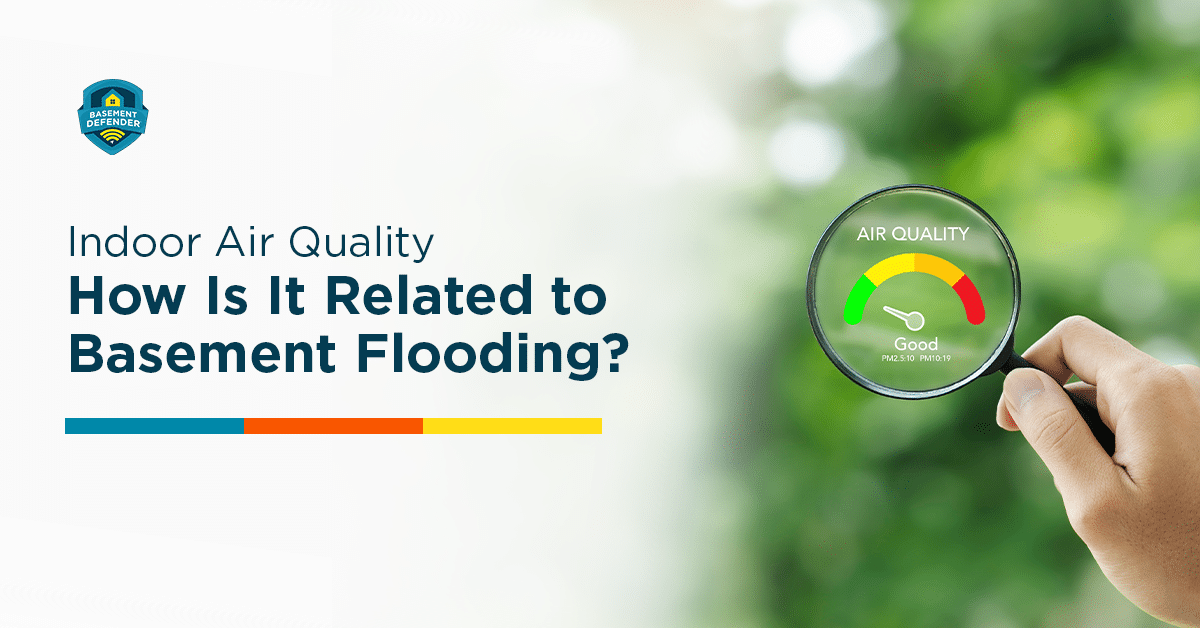
Indoor air quality, the often-overlooked champion of daily well-being, plays a significant role in everyone’s health and comfort. It affects people inside their homes, where many spend most of their time.
Studies show that Americans spend around 90% of their lives indoors, making air quality a crucial concern. But what if you find an unexpected connection between basement flooding and compromised indoor air quality?
Yes, the health hazards of mold growth and other air pollutants are lurking beneath your property and could be dangerous if left unchecked. But fear not! This article is here to help you on how to prevent basement flooding and improve indoor air quality in your home.
Before diving into its implications, here are some common basement flooding causes. Understanding these can help homeowners take proactive steps to prevent such disasters and the health risks of a wet basement.
Heavy rainfall can overwhelm the capacity of your gutters, downspouts, and drainage system, causing water to collect around your foundation and leak into your basement. This issue is common in storm-prone regions like the Midwest and the East Coast.
In the colder months, melting snow can create a large amount of runoff water that saturates the soil around your foundation. It creates hydrostatic pressure, pushing water through cracks and gaps in your basement walls and floor.
Poor drainage can result from clogged or damaged gutters, downspouts, drains, or improper grading and landscaping around your home. When water cannot flow away from your foundation, it accumulates and eventually leaks into your basement, causing damage and compromising basement air quality.
Foundation cracks can develop due to natural settling, soil erosion, tree roots, or hydrostatic pressure. When left unfixed, these become pathways for water to enter your basement through the walls or floor. Remember: ensuring a solid foundation is vital to preventing basement flooding.
Plumbing leaks can occur in pipes, faucets, toilets, sinks, showers, and water heaters in or near your basement. Such can lead to significant water damage to your basement walls, floor, ceiling, insulation, and more.
Sump pump systems play a significant role in preventing basement flooding. They remove excess water, reducing the risk of water damage and mold growth. This is why regular sump pump maintenance should be a priority if you live in flood-prone areas.
The Basement DefenderTM smart sump pump monitor alarm system is one innovative solution for early detection and prevention of sump pump failures. It ensures your sump pump is in optimal working condition, providing peace of mind during storms and heavy rainfall.
Basement flooding can lead to air quality problems, primarily due to mold growth and other air pollutants. These problems can have a direct influence on your health and well-being, resulting in any of the following:
Exposure to air pollutants like mold, bacteria, and dust mites can trigger allergies in susceptible individuals. Common symptoms include sneezing, runny or stuffy nose, itchy or watery eyes, and skin rashes.
Prolonged exposure to allergens in your home’s air can lead to chronic allergy symptoms, affecting overall quality of life.
For those with asthma, poor indoor air quality can exacerbate their condition. Airborne pollutants, especially mold spores and dust mites, can trigger or worsen asthma attacks.
Wheezing, coughing, and chest tightness can become regular occurrences, making breathing difficult in your home difficult.
Bacteria and other harmful microorganisms in your indoor air can increase the danger of respiratory infections. These infections range from common colds to more severe conditions like bronchitis and pneumonia.
Children, older people, and individuals with weakened immune systems are particularly vulnerable to this, so it’s crucial to sort basement flooding out as soon as possible.
Air pollutants, like volatile organic compounds (VOCs), can contribute to headaches and migraines. These compounds can release harmful gasses into the air, leading to a range of discomfort and pain. Inhaling these substances over time can lead to chronic headaches.
Exposure to certain indoor air pollutants, especially VOCs and mold mycotoxins, can lead to feelings of nausea. This unpleasant sensation can disrupt your daily life and well-being, affecting your overall comfort at home.
Additionally, it’s important to understand that the air in your home often comes from your basement, a phenomenon known as the Stack Effect. Vertical airflow from the basement can significantly impact indoor air quality by carrying pollutants into living spaces.
A flooded basement can usher in health hazards like mold growth and indoor air pollutants, and these unwelcome guests can disrupt the serenity of your home and jeopardize your health.
For homeowners with cinder block foundations, consider adding a moisture and vapor barrier to encapsulate the basement walls. This strategy helps prevent moisture infiltration and stops water from seeping through porous cinder blocks into your basement.
Taking proactive steps and investing in basement flooding solutions, such as maintaining your drainage system, addressing foundation issues, and installing a smart sump pump monitor, ensures your property and well-being are well-protected from the storms that life may throw.
As you contemplate the path forward, remember that Basement DefenderTM stands ready to assist you with all your basement needs! Visit our contact page, fill out the form, and explore our shop for sump pump replacements and upgrade projects to fortify your home!

Roy is a respected authority in the waterproofing industry, with over 40 years of experience under his belt. His company, Perma-Seal, has earned a reputation as Chicagoland’s premier waterproofing contractor, thanks to Roy’s unwavering commitment to quality, integrity, and customer satisfaction.
His latest innovation, the Basement Defender, is a testament to his dedication to providing homeowners with the best possible protection against basement flooding, representing a major leap forward in the industry’s efforts to prevent water damage and save homeowners from costly repairs.

Use code BDFREESHIP26 at checkout to get FREE shipping